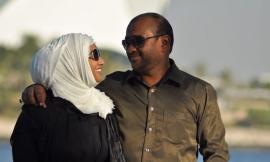
Although families have many roles and functions, their main value lies in the web of intricate relationships they weave, which are irreplaceable by any other social form or structure.
Everyone is born into a family, has lived in a family, knows a family, and is related to a family either by marriage, adoption, or birth. Each member of the family is bound to it by biological, psychological, social, economic, emotional and religious bonds. Therefore, the stability of any society or civilization hinges on a healthy balance and interchange among family members in helping to create strong self-identity and the moral and religious values of society at large.
In our postmodern era, the social phenomena of rampant divorce, cyclic family violence, deconstruction of traditional family units, and dramatic changes in gender roles, all pose complex and intriguing challenges -- not only for Muslims, but for humanity as a whole. Many problems affecting Muslim families today are universal ones that can and do occur in virtually any geographic area or social setting; however, the biggest challenges to contemporary marriage are rooted very deeply in the North American social upheaval of the 1960s, along with media-created myths and fairytales.
According to Dr. Ilyas Ba-Yunus, professor at East-West University in Chicago, the Muslim community's divorce rate (especially among the young) is almost 40%, compared to 50-52% in the general population. In Saudi Arabia 70,000 marriages and 13,000 divorces were recorded in 2003; in the city of Riyadh alone there were 8,500 marriages and 3,000 divorces in 2002 (Arab News, 2004).
Sadly, Muslims have bought into the same myth of Hollywood and Bollywood love that focuses on self-gratification, narcissism and the "me first" mantra that surfaced so unashamedly in the 1980s. In the mythical land of movies, the love-struck hero and heroine sail through any difficulties by singing, dancing, drinking and believing in “happily ever after,” feeding the illusory expectation that this will indeed happen to ordinary folks in real life. The media and corporate consumer marketers work overtime feeding the profitable myth that (to paraphrase the hit Beatles song) "all you need is love"; and that love – or perhaps, hormonally driven infatuation -- is the universal solvent in which all difficulties and problems automatically dissolve.
The idea of entering into marriage for practical reasons, such as carrying on a family lineage, preserving cultural tradition, or to protect property ownership, is considered a remnant of bygone times. Today we are told that marriage is all about love and happiness, yet too few in our society understand either of these concepts. There is nothing wrong with the emotional escapism and entertainment value of Bollywood or Hollywood romantic love -- as long as it is rooted in everyday life within the framework of reality, rather than in a make- believe fantasy land of effortless happiness.
Much has been said about the value of individual freedom and the pursuit of happiness as a panacea for our modern ills. But the idea that unlimited freedom necessarily leads to happiness is one of the mass media’s grand illusions that currently dominate our emotional folklore. Freedom without a good dose of mature responsibility offers neither happiness nor fulfillment. Such a narrow perception, based on one's own needs, wishes, and desires, is in fact anti-family because it eliminates the very necessary components of self-discipline and self-denial.
In our all-consuming orgy of seeking happiness through material goods and services -- everything from diamonds to “radical makeover” surgery -- marriage, like free sex, is viewed more and more as just another luxury item that's available in abundance and just as easily discarded when seemingly better models come along. In fact, romantic love as a motivation for marriage is a distortion more aptly described as erotica, or purely sexual attraction, which is nothing less than commercial in its ideology. Sexuality is not denied in the Qur’an, as in the teachings of some other religions; but neither is it confused with the true values that establish healthy relationships, such as care, compassion and mercy.
Closely allied to contemporary illusions of romantic love are the unrealistic expectations most couples have of the rewards and satisfaction to be found in marriage. Again, much of the problem stems from the over-glamorization of marriage in mass advertising. “In ads, handsome, well dressed young couples drive off to party or clubs in a new model car, unload their children at day care or baby sitters, and there is no visual presence of parents or extended family members," says one source. "As a matter of fact, kids are so perfect even babies don’t cry, burp, vomit, or get sick.”
Despite the increasing divorce rates, we still cling to the convenient myth that when a man marries a woman, the two will automatically coalesce into one harmonious unit. Perhaps this is a carryover of the old Biblical notion of marriage ("and he shall cleave unto his wife: and they shall become one flesh"), or maybe it is also the natural outcome of our media-manipulated minds to believe that marriage is one long blissful honeymoon that meets all our desires, wants, and needs.
The Qur’an, however, does not consider marriage as the coalescing of two individuals into one unit, nor does it endorse the authority-and-subservience concept of husband in relation to wife. Rather, the relationship is described as "mithaq" -- a firm and strong marriage contract between two independent and autonomous consenting adults of sound body and mind. There is great and timeless wisdom in this Qur’anic arrangement which offers a radical contrast (and challenge!) to our postmodern values, when everything, including the much-abused term “love,” is measured in terms of money, power and greed.
The crucial point here is that Islamic social order does not negate the individual, or replace his/her personality in marriage. Everyone is answerable for their own deeds and actions, so individual responsibility and individuality are complemented rather than threatened: according to the Qur’an, individuality is neither reducible nor transferable.
Qur’anic teaching understands human nature intimately and thus provides rules and laws accordingly so that our behaviors and family relationships are less likely to be "dysfunctional." Muslims should look to the Qur’an for guidance in seeking and establishing healthy male-female relationships, for without this wisdom and discernment in love, there can be no healthy family or society.
Excerpted from A Mosiac of Thoughts, Wahida Valiante's recently published book.
----------------
Sr. Wahida Valiante is currently the National President and founding member of the Canadian Islamic Congress (CIC) and the Chair of Islamic History Month Canada. She is a Canadian trained social worker and therapist who specializes in couple and family therapy, family mediation, domestic violence, and post traumatic stress disorder. In 2010 and 2011, Sr. Wahida was recognized among the "500 Most Influential Muslims in the World". She is the author of A Mosiac of Thoughts.








Add new comment